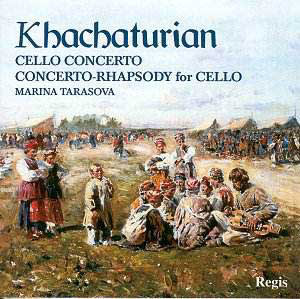Khachaturian was born in Armenia in 1903 and at the
age of eighteen he left his native country for Moscow. He learned to
read Russian and entered music school at the Gnessin Institute moving
on to the Moscow Conservatory to study the cello, then composition.
Khachaturian’s teachers included luminaries such as Vasilenko, Gliere,
Gnessin and Miaskovsky although his music remained strongly influenced
by the folk music of his native Armenia.
Music writer David Ewen provides a quotation which
aptly describes Khachaturian’s music: "The intonations, the rhythmic
patterns, the oriental colourings, and the dramatic emotional contrasts
found in Armenian folk songs and dances are the predominant traits of
Khachaturian’s music." A similar view is given by musicologist
Mark Morris who writes that Khachaturian had a, "Penchant for bright
colours, traditional harmonies and bold tunes … [which] with his vivid
sense of colour, melodious flow, gives his music a touch of exotic piquancy."
Khachaturian’s ability to convey colour and rhythmic momentum in a highly
dramatic and lyrical vein is clearly apparent even at the first hearing
of his music.
‘Shackled together’ with his contemporaries Shostakovich
and Prokofiev, Khachaturian’s music was censored for ‘bourgeois formalism’
and became unacceptable to the Soviet authorities. Although Khachaturian
had done virtually everything asked of him, "His only sin was to
have charmed the West with the excellence of his music," according
to music writer Norman Lebrecht.
Khachaturian composed his Cello Concerto in 1946 and
it was first performed by its dedicatee Sviatoslav Knushevitsky. The
concerto is vigorous, felicitous and attractive with serious Armenian
folk influences but it does not have the inspiration and thematic memorability
of many of his other major works; such as the Gayaneh and Spartacus
ballets and the violin concerto. The first movement allegro moderato
is overlong at nearly 18 minutes and the movements do not contrast sufficiently
to sustain the interest together with an uncharacteristic lack of a
‘big tune’. This rather reflective concerto represents Khachaturian’s
first major post-war composition and clearly cannot be classed as one
of his great concertos.
There are two significant competitors for the Cello
Concerto the first from Chandos with Raphael Wallfisch as soloist with
the LPO, under Bryden Thomson, where in a high quality recording Wallfisch
and the orchestra collaborate rewardingly. The other notable version
is on the BIS label with Mats Lidström as soloist giving an excellent
performance with the Gothenburg SO under Vladimir Ashkenazy, although
it must be said that the sound quality does not always match the quality
of the playing.
On this Regis Records digital recording acclaimed soloist
Marina Tarasova plays with total passion and commitment throughout.
She is particularly impressive in the extended languorous passage in
the second movement andante sostenuto that evolves into an intensified
lament. Although Tarasova is one of Russia’s best kept secrets even
she is unable to make this music sound better than average. The recording
is bone dry but it is no worse for that with a bright orchestral sound
throughout. However the forward placed cello does dominate the gutsy
orchestral accompaniment more than one would prefer.
The Concerto-Rhapsody, for cello and orchestra, from
1963, was the middle one of a series of three rhapsodies that Khachaturian
announced that he was composing for younger cellists. The Concerto-Rhapsody
is a virtuoso work composed in a single movement with three distinguishable
sections. The work was designed to exploit the phenomenal technique
of the distinguished Russian cellist and its dedicatee Mstislav Rostropovich
who also gave the world premiere performance in the Royal Festival Hall,
in London.
I have always rated this work very highly since having
a copy of a Melodiya/EMI vinyl LP with the dedicatee Rostropovich as
soloist and the USSR SO under Yevgeny Svetlanov in my collection for
years. Malcolm Rayment provides a wonderful insight on the LP sleeve
notes, "Much of the cello part lies extremely high and often there
are rapid passages in double and triple stopping. Although the music
is often improvisatory in nature, the overall construction is much tighter
than the title would suggest."
Significantly much of the material in the Concerto-Rhapsody
derives from a theme which is gradually build up by the orchestra first
heard by the horns at the start of the work and returns frequently in
a variety of guises. After a substantial statement by the orchestra
the cello makes his entrance and is almost continually occupied thereafter
making tremendous demands on the soloist. The highlight of the work
is the huge cello cadenza for cello which plays for a large proportion
of the first movement andante sostenuto e pesante.
Not for the faint hearted this Concerto-Rhapsody is
a big-boned cello concerto in all but name and soloist Marina Tarasova
was made for the part; bold and gutsy and taking the work by the scruff
of the neck. Clearly revelling in this repertoire Tarasova has an extremely
strong tone making light of the exacting technical and physical nature
of the work. She plays with impeccable control and technique throughout.
Tarasova’s expressive intensity and energetic performance is eminently
persuasive, and I could not imagine this Concerto-Rhapsody being played
better. The orchestral accompaniment is all that can be expected for
having lost the fight with the cello and the recording is again dry
and bright.
A rival version of the Concerto-Rhapsody has been available
on a BMG/Melodiya Twofer played by Karine Georgian, with the USSR RTV
Large SO, conducted by the Composer. According to the Penguin Guide
the playing is passionate and full-bodied in tone with an acceptable
recording.
Recorded in Moscow in 1994 this Regis Records release
at superbargain price is well worth considering to obtain both the Cello
Concerto and the Concerto-Rhapsody and recommendable for Tarasova’s
amazing performances.
Michael Cookson
See also review
by Jonathan Woolf


